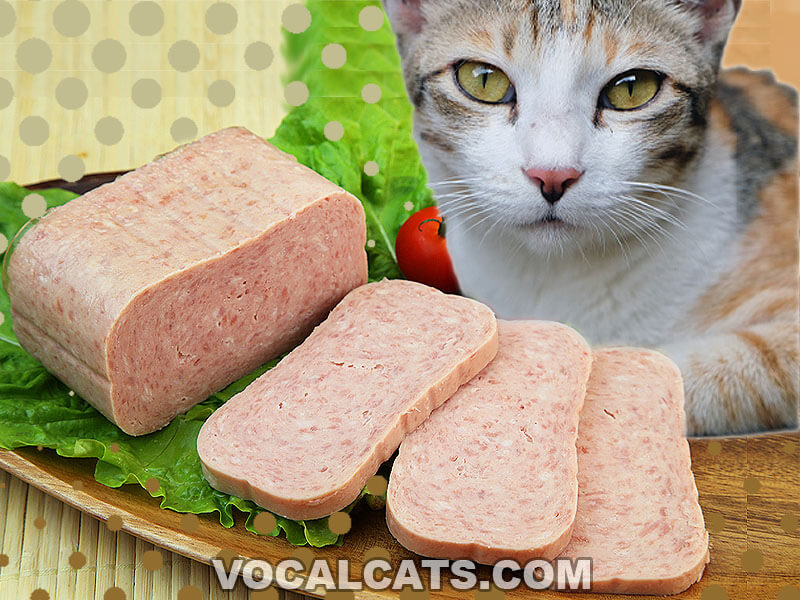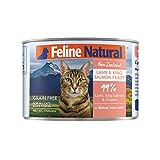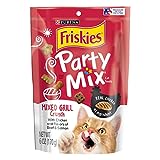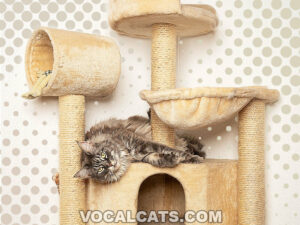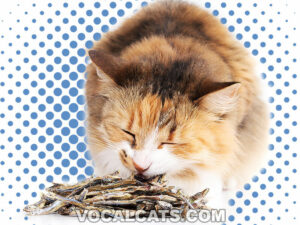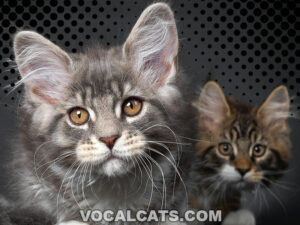Can Cats Eat Spam? No, cats should not eat Spam because this canned food is full of spices like salt, sugar, and potato starch. These three ingredients alone can wreak havoc on your cat’s kidneys, heart, and other organs. To make matters worse, preservatives are added which can also cause nutritional imbalance if eaten regularly.
Spam is one of my favorite breakfast staples. While frying it, Spam gives off an aroma that my cat finds irresistible. As a responsible cat parent, I wanted to know if I could share a piece with my kitty. So, I consulted with my cat’s vet and asked ‘Can my cat eat Spam?’ and her reply to me was “No.”
Our cats have different nutritional requirements. While moderate intake of processed food like Spam and Vienna sausage won’t harm us, the case is not valid for our cats. So, today, we will discuss with you the ingredients of Spam, how it’s made, and why it is not a suitable food for our feline friends.
Contents
- Can Cats Have Spam?
- What is Spam?
- What is Spam made of?
- Is Spam Good For Cats?
- Is Spam Bad For Cats?
- So, Is Spam Ok For Cats?
- Is Spam Safe For Cats?
- Can Kittens Eat Spam?
- Cats And Spam
- Can Cats Eat Spam Raw?
- Can Cats Eat Spam As A Treat?
- Can Cats Eat Spam Lite?
- Can Cats Eat Turkey Spam?
- What Human Food Can Cats Eat?
- Alternatives To Spam For Cats
- My Cat Ate Spam! What To Do If My Cat Ate Spam?
- So, Can Cats Eat Spam?
- Related Questions
Can Cats Have Spam?
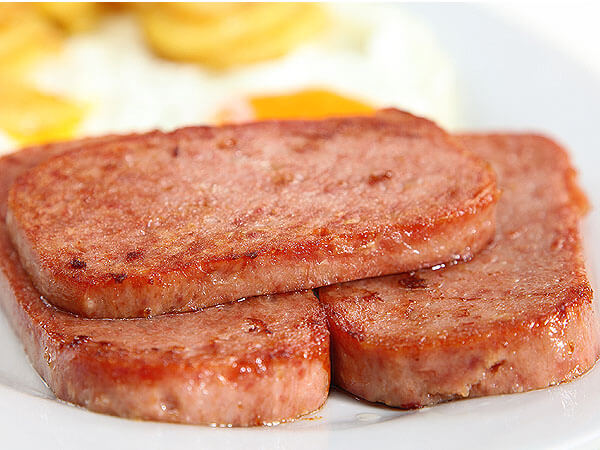
No, cats should not have Spam. Feeding your cat Spam is a bad idea. Even though our cats are obligate carnivores, Spam is not a healthy choice for them.
Yes, Spam is primarily made with pork but the added ingredients to make it flavorful are bad for their health.
I encourage you to study the nutritional profile of one (1) piece or slice of Spam in the table I’ve shared with you. This table gives you a clear perspective of the nutritional values of Spam.
READ NEXT: Can Cats Eat Pepperoni? The Salty Truth Exposed!
Based on those figures, here are some reasons why I do not give Spam to my fluffy friends as a cat treat.
- First, the calories. Adult cats should only consume 25 calories from cat treats per day. The table below shows that one (1) piece of Spam is equivalent to 100 calories. Assuming that you only intend to give ½ slice of Spam to your cat, that still is way more than the allowed caloric intake for cat treats.
- Second, let’s consider the fat and cholesterol content of Spam. The healthy fat intake of adult cats per day is about 6 grams. So, even if you give your fur baby just a piece of Spam, his body is receiving more than the allowed fat intake daily.
- Then let’s look at the high potassium level of a piece of Spam. Cats should only have 0.33 grams of potassium each day. Otherwise, it can lead to a medical condition called hyperkalemia. What is the potassium level of one (1) piece of Spam? 136mg or nearly a third of their potassium intake limit from such an unhealthy food!
- Now let us jump to the sodium level. Our cats should only eat 42 mg of sodium/day. The problem with Spam is it contains a high sodium level of 470 mg for every piece of Spam. Now that alone is more than enough reason not to feed your fur baby with Spam.
Nutritional Profile of Spam (1 piece or 34 grams)
| Name, Unit | Amount |
| Calories, cal | 100 |
| Sodium, mg | 470 |
| Carbohydrate, g | 1.53 |
| Total Fat, g | 8.9 |
| Cholesterol, mg | 13 |
| Protein, g | 4.47 |
| Iron, mg | 0.213 |
| Calcium, mg | 0 |
| Magnesium, mg | 4.7 |
| Phosphorus, mg | 50.33 |
| Potassium, mg | 136 |
What is Spam?
Spam is a brand of canned pork luncheon meat that can be consumed straight from the can or cooked to further enhance its flavor. It is manufactured by Hormel Foods Corporation based in Minnesota with the first production made in 1937.
The product was highly rationed during the Second World War to American troops stationed in Hawaii and Guam.
It’s unclear where the word “Spam” came from, with some suggesting it’s a contraction of “SPiced hAM.” Others say it stands for “special processed American meat.”
Since the 1950s, the product has gained popularity all around the world with over 14 kinds of flavors available.
What is Spam made of?
The original Spam is made with just six (6) simple ingredients: a blend of mostly ground pork shoulder with some percentage of pork ham, salt, potato starch, water, sugar, and sodium nitrite.
Salt and sugar are added to flavor the meat with the salt also acting as a preservative while water and potato starch are used to hold all the ingredients together.
READ ALSO: Can Cats Eat Imitation Crab? Purr-suing the Truth About Surimi!
Sodium nitrite is added as a preservative and also prevents botulism. The sodium nitrite is also what gives the product its pink coloring which would otherwise turn brown if not added.
A gelatin forms naturally around the meat from the water and fat during the cooking and canning process.
Further innovations of the product were introduced over the years with new flavors offered that contain cheese chunks, jalapeno, and garlic among other components.
Since cats are obligate carnivores, whose diet relies mainly on meat to survive, it might cause some to think that Spam may be a good source of animal protein.
Whether this is true or not, we will discuss further below on how some of the ingredients contained in Spam can affect the overall health of our fur baby.
Is Spam Good For Cats?
Since Spam is composed of animal protein, which, in this case, is pork, can a cat eat Spam and incorporate it into their diet?
Spam is not good for cats because pork, as a general rule, is not recommended to be consumed regularly by cats. Spam is also highly processed and contains additives that can be harmful to cats.
The best sources of animal protein are often chicken, turkey, duck, and salmon.
These meats supply the amino acid taurine, which cats require in significant amounts in their diet. Their ability to digest food, have healthy muscle function, have proper vision, and have a robust immune system all depend on taurine.
RECOMMENDED: Can Cats Eat Rotisserie Chicken?
Processed foods, like Spam, don’t contain the necessary nutrients that your cat needs and more often would cause nutritional imbalance and chronic inflammation if fed regularly.
Inflammation leads to oxidative stress in the body which is the root of most degenerative diseases, like diabetes, heart disease, and kidney disease.
Is Spam Bad For Cats?
Yes, Spam is not recommended for cats because it is a highly processed food that contains excessive amounts of salt and fat.
While a tiny portion cannot harm your cat, feeding them regularly this processed food will ultimately cause major health issues, such as heart disease, diabetes, and kidney problems.
To get a better idea of why Spam is not good for the health of your cat, let us take a closer look at the main ingredients contained in this fare.
1. Pork
Pork is just not an ideal protein source for cats. It can be given occasionally but not regularly.
While pork contains vitamins, minerals and essential amino acids, like taurine, which aids in proper vision, heart function, and a healthy immune system, the high saturated fat and sodium content of the meat makes it an unhealthy choice for cats.
Cats are obligate carnivores and can process fats and proteins efficiently for energy. However, too much of it can lead to clogged arteries, obesity, and heart disease.
Moreover, the sodium content of pork is higher compared to other meats like beef or chicken. A 3oz cooked pork contains around 70mg of sodium compared to cooked beef which is 55mg.
Sodium can adversely affect the heart, liver, and kidneys of your cat over time if there is an excessive amount present in their system.
2. Salt
One piece of Spam contains nearly 500mg of sodium. For an average-sized cat whose daily sodium intake should not exceed 40mg, a piece of Spam is too much for a cat to handle.
Excessive sodium causes salt poisoning in cats which can quickly dehydrate their bodies.
In extreme cases, a cat may suffer seizures, tremors, and may even pass away.
RELATED: Can Cats Eat Saltine Crackers?
3. Sodium Nitrite
Sodium nitrite is used mainly in foods to prevent bacterial growth, specifically, the Clostridium botulinum bacteria that causes botulism.
In small amounts, this preservative is not considered toxic to cats. In fact, it is found in many commercially available cat foods.
However, cats consuming sodium nitrite in excessive quantities over time would cause severe effects on their health over time. Some studies also suggest that toxic concentrations of this preservative may cause cancer.
4. Potato Starch
Modified potato starch is used as a binder for Spam to hold the whole thing together. Starch is easily digested by cats but can also increase their blood glucose levels instantly.
Excessive glucose in the bloodstream gets stored in the body as fat and results in insulin resistance over time leading to diabetes.
So, Is Spam Ok For Cats?
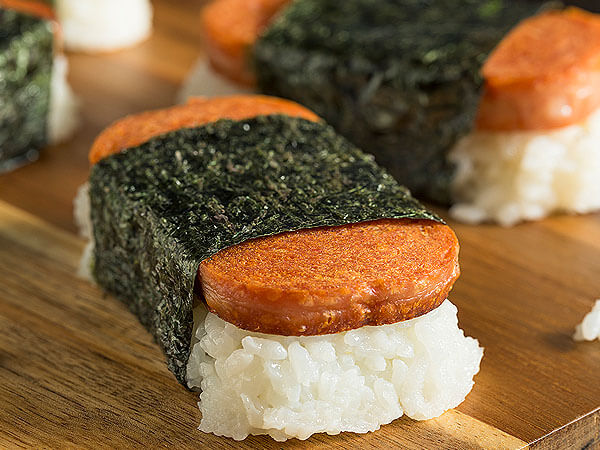
No, Spam is not OK for cats because eating too much makes them at risk for the following diseases:
1. Obesity
No one will argue that Spam is yummy but it is loaded with fat and cholesterol. Regularly feeding your cat with Spam will cause him to add unnecessary pounds to the point of getting obese.
Feline obesity is a health problem that can bring about other diseases like diabetes and cardiovascular disease. Obese cats are prone to develop hypertension, cardiac hypertrophy, and myocardial hypoxia.
Let’s not forget that obesity can also affect the mobility of cats. Excess weight puts stress on the joints and bones, thus, causing osteoarthritis.
2. Salt Poisoning
Eating food with a lot of salt in it such as Spam causes sodium ion poisoning in cats. Salt draws out fluid from the healthy cells of our cats which then leads to dehydration.
Some of the symptoms are:
- Excessive drinking
- Excessive urination
- Increased heart rate
- Muscle cramps
- Coma
If you suspect your cat has salt toxicity, call your vet as soon as possible or the Pet Poison Helpline at (855) 764-7661. Your fluffy friends need immediate medical attention.
DON’T MISS: Can Cats Eat Goldfish Crackers?
3. Pancreatitis
While the exact cause of pancreatitis is still unknown, the potential factors that inflame the pancreas are related to diet. High levels of fat are one of those.
Listed below are the symptoms of pancreatitis:
- Decreased appetite
- Jaundice
- Abdominal pain
- Fever
4. Gastrointestinal problems
Regularly feeding our cats with processed food like Spam can result in gastrointestinal problems.
The high levels of sodium and preservatives in Spam may overwhelm their digestive system which can cause vomiting and diarrhea.
Moreover, not all cats react similarly to food preservatives like sodium nitrite. If your cat happens to be sensitive to preservatives, he or she may also suffer from food allergies.
5. Nutritional imbalance
Our cats need specific nutrients that are not present in Spam and one of those is taurine. This processed food offers nothing but empty calories.
If you keep on giving your cat unhealthy food like Spam, he or she will eventually suffer from it and may shorten its lifespan.
Is Spam Safe For Cats?
In case you left some tiny pieces of Spam on the dinner table which your cat ate with gusto, you don’t have to rush to the vet clinic right away.
A few bites of Spam won’t harm your cat but the story is different if you always give it as a cat treat. If that’s the case, you can expect your fur baby to suffer from any of the medical conditions I discussed above.
Can Kittens Eat Spam?
No, kittens shouldn’t eat Spam. In fact, kittens should stay away from any human food that is made with a lot of seasonings and preservatives.
If adult cats have a hard time expelling too much salt, what more with kittens? This will only result in kidney complications.
Also, too much salt intake leads to nutritional imbalance. As the body tries to get rid of salt, it also depletes the other essential minerals like calcium which kittens need for bone and muscle development.
Kittens grow rapidly during the first 6 months and during these times, a balanced diet of protein, vitamins, and essential minerals like calcium and amino acids should be provided.
Additionally, cat treats that have calcium in them are the better alternative to Spam.
Cats And Spam
Spam is a kitchen staple for many households. But, think twice before giving Spam to your cat.
What nutritional values can Spam give to your cat? Is high caloric and saturated fat cat treats beneficial? Will Spam make your cat healthier?
Spam may be tasty but offers nothing but empty calories to our cats.
Can Cats Eat Spam Raw?
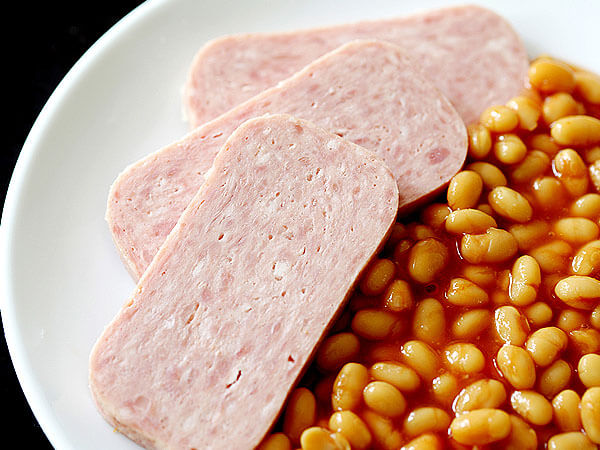
No, cats should not eat Spam raw. Regardless of whether you fry, add to sauces, or eat Spam straight from the can, you should not share it with your fur baby.
Spam has undergone a cooking process with preservatives before it was canned for a longer shelf life.
Can Cats Eat Spam As A Treat?
No, cats should not eat Spam as a treat. The best cat treats for cats are those that are low in sodium and should also not exceed 10% of their caloric needs.
The best cat treats for our fur babies are the ones that are low in calories and are a good source of protein which Spam does not offer.
Can Cats Eat Spam Lite?
No, cats should not eat Spam lite. Regardless of whether it is Spam Lite or Classic Spam, this is still a processed food that contain preservatives in it.
Even if the sodium level in Spam Lite is cut in half, it is still high for our fur babies to consume.
Can Cats Eat Turkey Spam?
No, cats should not eat turkey Spam. Turkey Spam is also flavored with a lot of spices that are bad for our fluffy friends. While turkey Spam has fewer calories, the salt content is still high for our cats to consume.
Aside from salt, turkey Spam also contains food preservatives that are not safe for our cats to consume in large amounts.
What Human Food Can Cats Eat?
Cats do not have the same nutritional requirements as humans.
While you may want your fur baby to have a taste of your delicious food, that may not be a good idea because some foods that we eat are toxic for our cats.
For example, avocado may be good for us but it is mildly toxic to cats. The same is true with dairy products because cats are lactose-intolerant.
This is why it is best if your cat just stick to his or her cat food rather than eating human food because you’ll never know whether there will be adverse reactions or not.
However, if you insist on giving your cat human food, it’s best if you limit it to meat protein like chicken, fish, and lamb but without any seasonings.
Alternatives To Spam For Cats
As a cat parent, isn’t it more beneficial for you and your cat if you will choose healthy food over those that are filled with a lot of salt and preservatives?
For one, it will prevent you from spending a lot of money on veterinary expenses brought about by diseases caused by unhealthy eating.
Second, changing to healthier food alternatives to Spam means a longer and happier life for your fur baby. That said, I highly suggest the Feline Natural Lamb And King Salmon cat food that I personally attest is beneficial for your cat:
This nutritious and well-balanced wet canned cat food is made with ethically caught fish and grass-fed and free-range lamb. This means that the meats are leaner, free from antibiotics, and have higher amounts of protein.
Another thing I love about this amazing wet canned cat food is that it does not contain allergy-causing ingredients like soy, rice, and potato.
Instead, what your fur baby gets is nothing but fresh and great-tasting food that is available in an easy-to-open can.
My Cat Ate Spam! What To Do If My Cat Ate Spam?
A tiny bit of Spam won’t make your cat sick. But if you’re not sure whether your fur baby ate a lot of it behind your back or not, here are some signs that may warrant a visit a trip to the vet:
- Vomiting
- Diarrhea
- Increased water intake
- Increased urination
- Lack of appetite
- Lethargy
- Abdominal pain
The vet will perform a variety of tests to confirm if your cat is indeed suffering from salt poisoning. If yes, the treatments to be administered are intravenous (IV) fluids to dilute sodium and to replace lost electrolytes.
In some cases, antibiotics may be administered if your cat shows signs of gastrointestinal infections.
So, Can Cats Eat Spam?
Spam is a highly processed food item that your cat doesn’t need in their diet. While a small amount may not be considered toxic, regularly feeding your fluffy friends this salty canned product will cause damaging results to their overall health.
Although it contains protein which cats need to survive, there are a variety of other meat products available that don’t contain excessive amounts of fat and salt.
Related Questions
No, cats should not eat uncooked Spam. Spam, whether cooked or uncooked, is not an advisable food to give to your cat. Although it contains a good amount of protein, it is chock full of other ingredients that can be harmful like salt, nitrates, and potato starch. The amount of salt alone in a slice of Spam contains more than the recommended daily sodium intake for a cat.
No, pets should not eat Spam. Highly processed foods like Spam are not recommended to be added to your pet’s diet. It changes the balance of bacteria in the intestines which ultimately triggers inflammation. Chronic inflammation is what causes common degenerative diseases, such as diabetes, kidney disease, and heart disease which can decrease your cat’s quality of life.
There are a variety of foods that are toxic to cats. The top 3 foods that are toxic to cats are chocolate, garlic and onions, and dairy products. Chocolate contains alkaloid theobromine that can cause vomiting, diarrhea, muscle tremors, and seizures when ingested even in small amounts. Garlic and onions damage red blood cells which can lead to anemia. Symptoms include jaundiced gums and skin, lethargy, and red to brown urine. Dairy products, such as milk and cheeses, are also toxic because cats are lactose-intolerant and don’t have the proper enzymes to digest cow’s milk and its by-products. It can upset their stomachs and cause diarrhea and vomiting.
Chicken and turkey are two of the best sources of protein for cats because they contain less fat and calories. Beef, lamb, and some liver can also be served as long as they are lean and properly cooked. Raw meats carry the risk of food poisoning and are not recommended. Feeding your cat’s bones is also not advisable since it can break their teeth and also cause blockages in the digestive tract.
Plain, meat-based gelatin is not bad for cats for it contains collagen and amino acids that support bone and skin health. However, flavored gelatins, as well as, the gelatin formed on the surface of Spam, are not recommended for cats. Additives such as sugar, nitrates, and salt are found in this gelatin which can cause issues detrimental to your cat’s health. Vegan-based gelatin is also not recommended since this offers no nutritional value and may even cause bowel blockage.
DISCLAIMER: THIS WEBSITE DOES NOT PROVIDE MEDICAL ADVICE
The information, including but not limited to, text, graphics, images and other material contained on this website are for informational purposes only. No material on this site is intended to be a substitute for professional veterinary advice, diagnosis, or treatment. Always seek the advice of your veterinarian or other qualified health care provider with any questions you may have regarding dietary needs.
SPAM is a registered trademark of Hormel Foods, LLC. Vocal Cats does not claim any ownership of the SPAM name, logo, or any identifying mark in any way. This article is for educational purposes only.
Resources:
https://vcahospitals.com/know-your-pet/taurine-in-cats

With over five years of specialized experience as an animal writer, my expertise lies in cat nutrition, health, behavior, grooming, and training. I am dedicated to delivering helpful and informative content that caters to the well-being of our feline friends. My primary goal is to empower pet owners with knowledge and ensure our feline companions thrive in health and happiness. In my free time, I love volunteering at local cat rescue centers.
